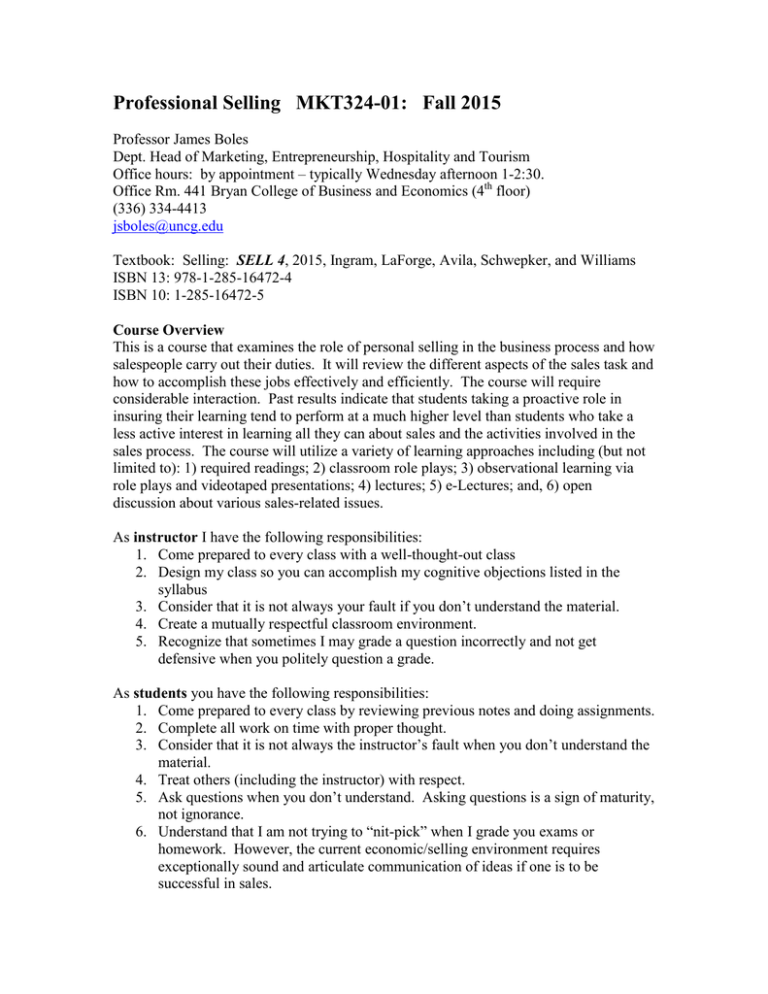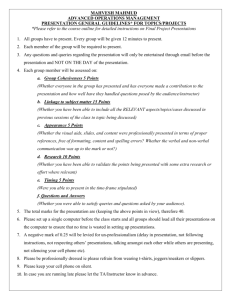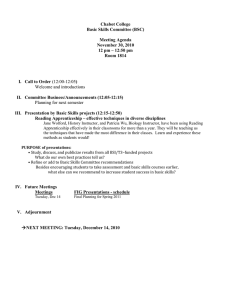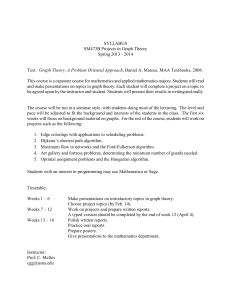Professional Selling MKT324-01: Fall 2015
advertisement

Professional Selling MKT324-01: Fall 2015 Professor James Boles Dept. Head of Marketing, Entrepreneurship, Hospitality and Tourism Office hours: by appointment – typically Wednesday afternoon 1-2:30. Office Rm. 441 Bryan College of Business and Economics (4th floor) (336) 334-4413 jsboles@uncg.edu Textbook: Selling: SELL 4, 2015, Ingram, LaForge, Avila, Schwepker, and Williams ISBN 13: 978-1-285-16472-4 ISBN 10: 1-285-16472-5 Course Overview This is a course that examines the role of personal selling in the business process and how salespeople carry out their duties. It will review the different aspects of the sales task and how to accomplish these jobs effectively and efficiently. The course will require considerable interaction. Past results indicate that students taking a proactive role in insuring their learning tend to perform at a much higher level than students who take a less active interest in learning all they can about sales and the activities involved in the sales process. The course will utilize a variety of learning approaches including (but not limited to): 1) required readings; 2) classroom role plays; 3) observational learning via role plays and videotaped presentations; 4) lectures; 5) e-Lectures; and, 6) open discussion about various sales-related issues. As instructor I have the following responsibilities: 1. Come prepared to every class with a well-thought-out class 2. Design my class so you can accomplish my cognitive objections listed in the syllabus 3. Consider that it is not always your fault if you don’t understand the material. 4. Create a mutually respectful classroom environment. 5. Recognize that sometimes I may grade a question incorrectly and not get defensive when you politely question a grade. As students you have the following responsibilities: 1. Come prepared to every class by reviewing previous notes and doing assignments. 2. Complete all work on time with proper thought. 3. Consider that it is not always the instructor’s fault when you don’t understand the material. 4. Treat others (including the instructor) with respect. 5. Ask questions when you don’t understand. Asking questions is a sign of maturity, not ignorance. 6. Understand that I am not trying to “nit-pick” when I grade you exams or homework. However, the current economic/selling environment requires exceptionally sound and articulate communication of ideas if one is to be successful in sales. Grading Grading for this course is based on 5 equally weighted components Quizzes Sales Presentation 1 Sales Presentation 2 Classroom Contribution Exam 2 20% 20% 20% 20% 20% Presentation Requirements The presentations in this class will be of two types. First, you will participate in a team selling exercise. One person can also do this presentation if a team-member quits or there are an odd number of people in the class. In the presentation, all team members are expected to participate on a fairly equal basis. The grade assigned will be for the team. Each individual in the class will also act as a buyer for one or more sales presentations. Team selling is an important aspect of many sales positions in the current economy. Having a partner with a different personality and/or educational background can be beneficial. Just because you already know someone does not mean that the two of you will make a good team. The team selling presentation will be based on a product/service that your professor provides. It will require you to develop presentation materials that enhance your presentation. These materials should be professional and easy to use. Further, the presentation materials should be similar to what you would develop if you were selling this product/service to a real buyer. In this sales role play, you will have one or more buyers and they will have developed objections that you may/may not have anticipated or heard in your previous presentation. This presentation will be assessed by the instructor and any other evaluators that he chooses to include in the evaluation process The second presentation will be an individual presentation. It will also be based on a product/service your professor selects. This presentation will be an individual grade based on your performance as assessed by the instructor and any other evaluators that he chooses to include in the evaluation process. In preparation for both presentations, each selling team must prepare a packet of presentation materials for the buyer(s) (and for the Professor). In a separate file, you must also include some possible objections that a potential customer might have to your product/service offering. This file of anticipated objections should be in the packet you give to Professor Boles. In-class activities on specific points related to the sales process will enhance your ability to perform well on the presentations. It is a challenging and very strictly graded aspect of your total learning experience. I have attached a scoring sheet for the sales presentations to this syllabus. I have attached a scoring sheet for the sales presentations to this syllabus. Remember, this is a sales class, not a public speaking class – the two require very different skill sets. Classroom Contribution This will have multiple components. First, you must attend class in order to participate. This includes the sales presentations of other students. Second, while attending class, you must take an active role in asking questions or making constructive comments during class discussions, mini-cases, and lectures, as well as providing constructive comments on the sales presentations. It is quite possible that you will be “cold-called” to discuss various assigned cases. These “cold-calls” will be at random throughout the lecture/discussion sessions. Thus, the Contribution Grade is composed of: 1) the inclass discussions, 2) short discussions, 3) a book review of 2 pages on a book assigned by the instructor; 4) in-class chapter based role plays; and, 5) Weekly Thank You Notes. Thank You Notes: It should be obvious that salespeople need to be able to absorb and summarize the important points covered in a meeting. They should also be able to write a decent thank you note. Therefore, a brief thank you note is required for every week, due at the beginning of the next week. This note should be nicely formatted and well-written, but most importantly should summarize the key ideas raised in the class. “Brief” means one page or less; any more would be likely to annoy your prospect. A good paragraph is enough room to include everything you need. I’ve included a sample letter at the end of this syllabus. Hint: The best time to write your thank you note is right after class. Quizzes Quizzes will be given on a weekly basis. They will require you to read the chapters and, when assigned, to listen to the e-Lectures. The quizzes will be short and are designed to make sure that people are reading the material, viewing the e-Lectures, preparing the cases, and keeping up with the rest of the class. Quizzes will be taken up at 6:16 or whenever the class is finished – whichever comes first. Once the quiz starts, you cannot take the quiz should you come in late. The lowest quiz grade will be dropped and the others averaged together to arrive at your semester quiz grade. Final Exam The Final exam will have 40 multiple choice questions and up to 10 short answer questions. Questions on these exams will require a student to listen to assigned lectures on e-Lecture, attend class and read the textbook in order to answer them effectively. These tests are generally considered to be quite difficult and require you to thoroughly master the material. Grades have typically averaged approximately a 76, with scores ranging from 58 to 96. Be sure to bring pencils, a calculator, and paper to class. Advice Due to the nature of the course (very compressed and quick-paced) it is essential that you keep up with your readings and assignments. There is nothing more certain to negatively affect your grade than to get behind. It has been my experience that once a student gets behind during a semester, him /her rarely, if ever, fully catches up in the class. Final Grade Assignment Scale A (93-100) A- (90-92) B+ (87-89) B (83-86) B- (80-82) C+ (77-79) C (73-76) C- (70-72) D (60-69) F (<60) Value Outstanding Excellence Mastered material Tagged the bases Unsatisfactory Unacceptable Promoted Raise No Raise Reviewed Fired 15-20% 50-60% 20-25% <5% <5% Organizational equivalent Typical Percentage DATE 1st Week 8/18 ASSIGNMENT Class introduction; review of the sales syllabus; review of the Sales project (team selling role play); Social Style matrix and its meaning for sales Form 2-3 person selling teams Discuss Selling and the Sales Process NEXT SESSION: Read Chapter 1 Role Play: Specialty Sports Inc. and be ready to: 1) discuss the questions concerning what occurs in the role play; Read Chapter 2 Cases: Kelly Meyers’ Dilemma, and Brisbane Uniform Company. Be ready to provide your answers to these questions. Read Chapters 1 & 2; Listen to e-Lecture for Chapter 2 2nd Week 8/25 Topic: trust in the sales process; INC videotape series Volume 1. Overview of personal selling video. Discuss cases from chapters 1 & 2. NEXT SESSION: Read Chapter 3 and listen to the e-Lecture on Ch. 3 “Understanding Buyers” Read Cases: “Selling for RelationshipsFirst, Inc.” and, Shoes Unlimited (one student will be asked to role play the Shoes Unlimited Case). 3rd Week 9/1 Topic: Understanding Consumer and Business Buyers. INC videotape series Vol. 2; Discuss cases on “Shoes Unlimited” and, RelationshipsFirst, Inc. Discussion & Lecutre: Chapter 3 (buyer behavior); 18 common sales mistakes; and, why major sales fail. NEXT SESSION: READ CHAPTER 4: Communication Skills; Lecture will be in Class; Prepare “Tech Solutions and Bartlett Associates Case” and, the “Applab Services Case” (make sure to develop ADAPT Questions) 4th Week 9/8 Topic: Communication Skills – Communicating, Listening, and Assessing Buyer Situations. Discuss cases: “Tech Solutions” and “Applab Services” Begin developing ADAPT Questions for your role play Discussion & Lecture on Chapter 4; Develop ADAPT Questions for a product/service NEXT SESSION: READ CHAPTER 5: Strategic Prospecting and Preparing for Sales Dialogue. Reach CHAPTER 6 Planning Sales Presentations 5th Week Topic: Lecture and Discussion on: Chapter 5 Strategic Prospecting and Ch. 9/15 6 Preparing for the Sales Dialogue Be prepared to discuss the Chapter 5 CASE. Be able to discuss the Benefits of Nimblefoot’s products. You need to be able to state WHY these benefits are significant to Trailrunner’s buyer. READ Chapters 7&8 for next week. 6th Week 9/22 Discussion and Lecture Chapter 7: Creating and Communicating Value and Chapter 8: Obtaining Commitment and Answering Questions. Sign Up for Team Presentations READ Chapter 9 for next week. 7th Week 9/29 Discussion and Lecture: Ch. 9: Developing and Expanding Customer Relationships; Work on presentations with your team member(s) READ Chapter 10 for next week. Ch. 10: Self-Leadership & Teamwork; Personal Time Management; Finalize team presentations: Sign Up for Individual Presentations. FALL HOLIDAY NO CLASS 8th Week 10/6 9th Week 10/13 10th Week 10/20 Role Play Exercise (Team) 11th Week 10/27 Role Play Exercise (Team) 12th Week 11/3 Major role play Presentation (individual) 13th Week 11/10 Major role play Presentation (individual 14th Week 11/17 Major role play Presentation (individual) 15th Week 11/24 Course review and debriefing 12/8 FINAL EXAM: Comprehensive Examination covering all chapters 1-10 This syllabus is tentative, and may change to: 1) meet learning objectives; 2) provide a better learning experience for the class; and 3) deal with any unexpected situations that can occur during a semester. Make sure that you stay up-to-date on any changes to this syllabus. COURSE POLICIES: SNAPSHOTS: To help me more quickly learn your names (necessary for accurate evaluation of participation) and for future references, please provide me with a copy of the picture from your ID and put your name on the back. Ideally, you can attach this to a resume or a brief biographical sketch regarding your educational background and work experience. This is due during the second class period. General Policies regarding grading: Missing over 4 classes during the semester will result in a student being dropped from the course. While extenuating circumstances can result in this requirement being waived, it is unlikely. If you know you will miss more than 4 classes, you should drop the course today and add a different course with less stringent attendance expectations. Any grade appeals must be done within 2 weeks of the posting of grades. Students With Disabilities: Students who have a Letter of Accommodation from the Office of Disability Services should identify themselves to the instructor of this course as soon as possible. That way provisions can be made to help you become as successful as possible. Disruptive Behavior: The following is from the University’s Disruptive Behavior Policy. Disruptive student behavior is student behavior in a classroom or other learning environment (to include both on-campus and off-campus locations), which disrupts the educational process. Disruptive class behavior for this purpose is defined by the instructor. Such behavior includes, but is not limited to, verbal or physical threats, repeated obscenities, unreasonable interference with class discussion, making/receiving personal phone calls or pages during class, leaving and entering class frequently in the absence of notice to instructor of illness or other extenuating circumstances, and persisting in disruptive personal conversations with other class members. For purposes of this policy, it may also be considered disruptive behavior for a student to exhibit threatening, intimidating, or other inappropriate behavior toward the instructor or classmates outside of class. When disruptive behavior occurs in a class…the instructor will warn the student. The warning will consist of orally notifying the student that his/her behavior is disruptive and that it must cease immediately or the student will face removal from the classes. Academic Honesty: All university and college regulations concerning withdrawal and academic honesty will apply. Students are expected to recognize and uphold standards of intellectual and academic integrity. The university assumes as a basic and minimum standard of conduct in academic matters that students be honest and that they submit for credit only the products of their own efforts. Students should be familiar with the university’s policy on issues such as plagiarism, unauthorized collaboration, falsification, and multiple submissions. Lack of knowledge of this policy is not an acceptable defense to any charge of academic dishonesty. Course’s Cognitive Objectives (form the basis of my role plays, written assignments, and exams): You should be able to: Needed skills and abilities: 1. Identify areas in the student’s own time management process that need work and improve those areas. (SI) 2. Modify her/his presentation to match the social style of a specific buyer. (RP, T) 3. Use listening skills to determine buyer needs. (RP) 4. Write and identify various types of ADAPT/SPIN questions. (WA, T, RP) 5. Interpret the meaning of various forms of non-verbal communication. (T, RP) 6. Use and identify various aspects of non-verbal communication that can be used to enhance the sales presentation (RP, T) 7. Present a product/service effectively in a face-to-face sales setting (RP) 8. Conduct a break-even analysis. (T, RP) Buying Process: 1. Identify the steps in the complex buying process typically used for big ticket and/or new task purchases. (T) 2. Identify different types of customers and the critical purchasing factors that will most influence their buying decision. (T) 3. Identify the types of organizational buying decisions and what a salesperson must do to be seriously considered in these buying situations. (T) 4. Identify the different people that can be involved in a purchase and their potential role in the buying center and decision. (T, RP) 5. Be able to select the most effective entry point into a prospect’s buying process. Selling Process: 1. Identifying the stages of the selling process from Prospecting through Follow-up. (T) 2. State the qualifications for a suspect to be a prospect. 3. Compare the effectiveness of different types of prospecting techniques for various types of buyers. (T) 4. Be able to use SPIN/ADAPT questions or other accepted questioning processes to identify buying issues. 5. Identify the purpose of an RFP and the various issues involved in responding to one. 6. Identify various negotiation pressure tactics and know how to respond to them. Sample Thank You Note 31 Spooner Street Atlanta, GA 30327 August 23, 2010 Dr. James Boles Instructor, Robinson College of Business 35 Broad Street NW Atlanta, GA 30303 This is only a sample—do not copy this word-for-word!! Any other business letter format is acceptable also. Also, don’t copy yourself verbatim. Vary the wording from class to class. But do feel free to keep the format the same as a template. Dear Dr. Boles: Thank you for taking the time to meet with me for another class session on Wednesday. I appreciate the chance to cover course-related policy materials as we begin a new semester. During the meeting, we discussed class policies such as the University’s Academic Honesty policy. You passed out the syllabus and also provided a brief introduction discussing the course and learning objectives. You also stressed that the course would emphasize relationship-oriented Adaptive Selling techniques. We then had an opportunity to introduce ourselves and offer our own learning goals. My action items coming out of this class are: Turn in this thank you note (status: done) Fill out my personal information page and attach a photo (status: done, and attached) Pick a partner for my presentation (status: not yet completed; I will select a partner by the end of class #2) I look forward to the opportunity to work with you this semester. Regards, Shorter S. Better Student Robinson College of Business 7. SALES PRESENTATION SCORING SHEET Possible Points Approach: 2 ___Initial introduction of self with enthusiasm 2 ___Effective use of rapport 2 ___Got prospect's attention 10 ___Used questions to establish prospect's needs ADAPT 2 ___ Established a basis for closing 2 ___Smooth transition into presentation 15 4 2 2 2 4 2 5 4 Presentation: ___Based on benefits ___Absence of verbal pauses/grammar slips/rate of speech, etc. ___Good eye contact ___Appropriate use of Nonverbal communication skills ___Got customer participation ___Used visuals that were effective and appropriate to the call ___Buyer could see visuals easily ___Did not interrupt the prospect ___Appropriate depth of coverage 2 3 2 5 3 Objections: ___Empathized ___Verified ___Displayed positive attitude and confidence ___Answered ___Trial closed 5 4 2 Closing: ___Uses trial closes effectively ___Used appropriate closing methods ___Post-closing communication 5 5 4 Overall: ___Professionalism ___Enthusiasm ___Understood facts of the case COMMENTS: __________________________________________________________________ ________________________________________________________________________ ________________________________________________________________________ ________________________________________________________________________ ________________________________________________________________________ ________________________________________________________________________ ________________________________________________________________________ ________________________________________________________________________




